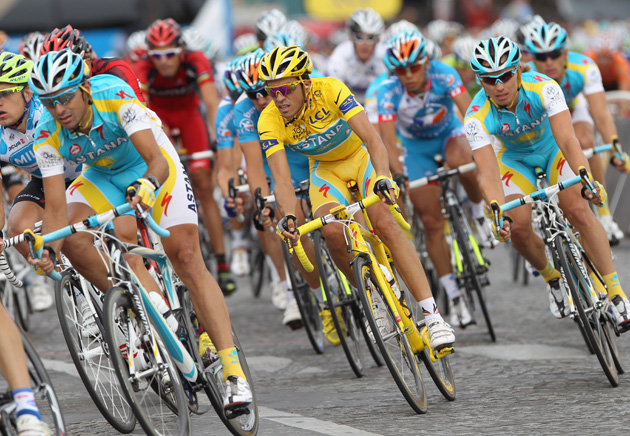Drafting Isn't Just For Cyclists
 Monday, July 23, 2012 at 04:19PM
Monday, July 23, 2012 at 04:19PM  CAtennis
CAtennis  Have you ever found yourself in a match situation where you are up a set and a break and, right before closing out the match, you managed to snatch defeat from the jaws of victory?! All players are familiar with this scenario. Maybe the opponent played better... maybe your shots stopped clicking... maybe the wind picked up... the balls got fuzzy... Numerous excuses can exist for what is nothing more than a rookie mistake. What is going on?! Why do so many good players allow their opponents to come from behind and beat them? One explanation could be that most players who are ahead have an imaginary time clock in their heads... they exert just enough energy to allow their opponents to "beat themselves". Although this works at some levels, at the more advanced stages it is more appropriate to replace the fictitious time clock with an image of the Tour de France.
Have you ever found yourself in a match situation where you are up a set and a break and, right before closing out the match, you managed to snatch defeat from the jaws of victory?! All players are familiar with this scenario. Maybe the opponent played better... maybe your shots stopped clicking... maybe the wind picked up... the balls got fuzzy... Numerous excuses can exist for what is nothing more than a rookie mistake. What is going on?! Why do so many good players allow their opponents to come from behind and beat them? One explanation could be that most players who are ahead have an imaginary time clock in their heads... they exert just enough energy to allow their opponents to "beat themselves". Although this works at some levels, at the more advanced stages it is more appropriate to replace the fictitious time clock with an image of the Tour de France.
You see, when it comes to road cycling, one strategy that is often used is the concept of "drafting". This is where a racer sits on the wheel of the front byciclist and allows such person to block the wind for him. Then, when the racers get close to the finish line, the trailing racer springs ahead - since he is more "fresh" - for victory. A similar thing happens in tennis; here, the player trailing on the scoreboard is constantly pressing his opponent to "beat him" by playing high intensity points and making few errors. Another factor that comes into play is that the trailing player has nothing left to lose so he's playing the points very loose. By not being pressured, he is free to hold serve with ease and figure out ways to chip at your service games. If the leading player's concentration slips, the trailing player may find himself in the lead just as things get interesting in the match. Therefore, when you find yourself ahead on the scoreboard, rather than waiting for the time to run out on your opponent, seek to expand the lead. Get one bike length in front, then two then three. In tennis, don't be satisfied with remaining up a break. Get up another break; and then another; then another. Be so far in front that the opponent has to work very hard just to pull even with you. Break the opponent at 30 or at 15... then see if you can break him at love. Don't be satisfied with "good enough". Stay hungry and stay interested. Sure, this is not the time for heroics, but do try to push the envelope a bit further. Chase balls that are clearly out. Challenge yourself to make good, hard first serves; get every return in play and show your opponent that you're "in it to win it".




